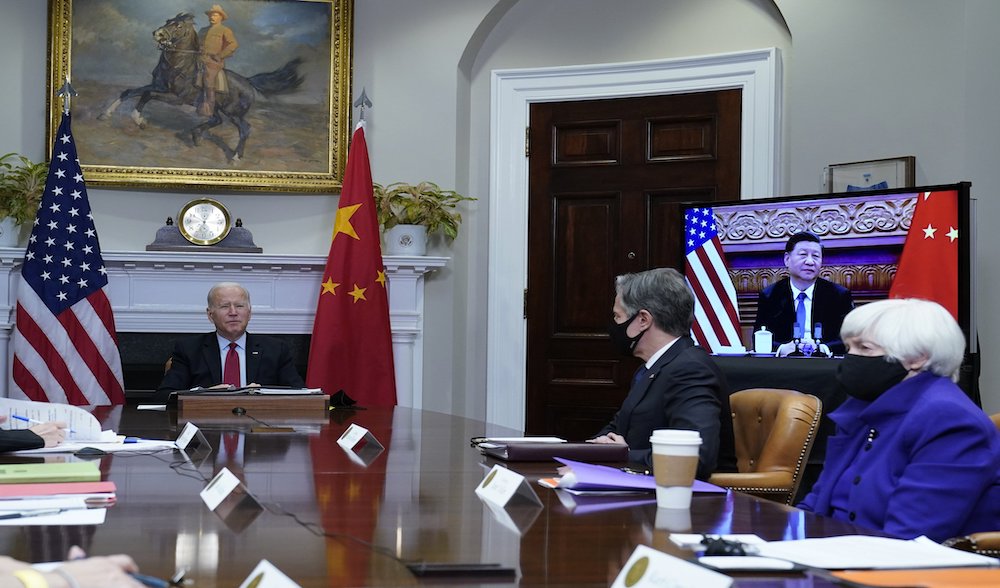TOM PLATE WRITES — Can it be that fresh air is being permitted to enter the closed casket of American foreign affairs thinking? The other day, a critique of U.S. policy toward China flat-lined on my computer screen that raised my hopes: it amounted to a reasoned plea for exactly the kind of strategic re-thinking America needs to put together soon. The essay called for junking the moribund confrontation/containment thing and re-pivoting to Asia with a respectful though calibrated appreciation of China’s growing stature in 21st century geopolitics. It coolly reprimanded both sides – but especially the U.S. – for fueling the blistering bilateral arms race when the race which both sides should be leading is the global marathon against climate-change and pandemic resurgence. The extraordinary thing about this article, though, was not just the substance itself but the notable platform of its transmission: the journal of the Council on Foreign Relations CFR) in New York.
For years, Foreign Affairs has not been everyone’s beside cup of tea. For truly cosmopolitan Americans, perhaps on the West Coast especially, Foreign Affairs and its parent CFR were viewed as an East Coast men’s club where grumpy grandees snoozed away in the library looking like they might sleep through even the intrusion of a fire truck, much less a new idea — the sort of establishment where the icy lobby receptionist stares down all coming through the door as if each were an agent of Karl Marx about to infect the mausoleum of capitalism with Covid communism. An unfeeling place where American triumphalism was on display for all to see, whether they liked it or not. But perhaps now the prospect of a different global future is starting to dawn even on the old Foreign Affairs club.
Influential establishment platforms can help nudge thinking outside of the bitter box – if only they would try harder. The author of the refreshing Foreign Affairs essay was Van Jackson, well known internationally: a Distinguished Fellow with the Asia Pacific Foundation of Canada, a Senior Lecturer in International Relations at Victoria University of Wellington in New Zealand, and a serial university teaching and research-center job-hopper in the States. Similar to Australia’s ever-wise Professor Hugh White, whose 2012 book ‘The China Choice’ offered smart new thinking for the white West, Jackson manages to stay a step ahead when most others continue to fall behind by their digging in: “Massively outgunned,” he writes, “China is acting rationally and predictably. Less rational is Washington sitting in a position of advantage, observing China’s clear track record of seeking to counter U.S. nuclear modernization, and then proceeding as if Beijing won’t do so in this case. By modernizing its nuclear force, the United States is giving China every reason to expand its own.” Implication: if Beijing wants to up its nuclear arsenal because the U.S. has so many, why not have the far-ahead U.S. reduce its arsenal rather than increase it to equalize the ‘buildup’ if we really want Beijing to cool it?
Level-headed, bias-free analysis of genuine needs is hard to find in American media. Patriotism would seem to require conformity. Recall – if you can bear to – the idiotic U.S. invasion of Iraq in 2003. Too many U.S. journalists – not to mention their editors and publishers – slipped on their mental combat uniforms and set out for the long march. The American people never really knew what was happening. That’s true today with China-U.S. tensions. The chairman of the Asia Society’s Hong Kong Centre last week had it about right when he downgraded the potential peace impact of the recent Biden-Xi video summit. At a seminar organized by the University of Hong Kong’s invaluable Research Hub on Institutions of China, real-estate plenipotentiary Ronnie Chan remarked, with tellingß zing: “What we are seeing today, don’t blame Donald Trump. Donald Trump no doubt took [US-China relations] to hell, but he was just the last straw that broke the camel’s back. It was 30 years in the making.”
China is red and reds are better dead — that’s the qualitative analysis that passes for mature judgment in the U.S. Congress. As Mr Chan rightly suggests, one-dimensional talks won’t cool the long-boiling hatred as long as the average American politician holds pre-school views on ‘Red China’. Thankfully, world-traveler Chan can always be counted on to offer singular perspectives on America and China. Because he is well-informed and willfully outspoken, he can cut through the blather without adding to it. At the university he notably dismissed as “ignorant” those waxing euphoric over the vid-summit. Knowing America (where he frequently stars at Asia Society fundraisers and educational platforms with his inimitable in-your-face style), he has more perspective on this issue than all but a very few of members of Congress. I do wish I could disagree with his pessimism. I might sleep better at night. But George Orwell was, at least with an issue like US-China relations, wrong, and Ronnie Chan right: Ignorance is not bliss.
What are some solutions? For starters, Washington needs to become more realistic and not try to replay 20th century containment or restage, for that matter, 19th century gunboat. Likewise, China has to cease scaring half the world to death, reflexively barking back at the slightest seeming offense or even hyper-retaliating economically over real ones. As long as being nice is not misunderstood as being weak – and is anyone today under the illusion that China is weak -why not try it another way? Put your scary wolves back in the zoo; deploy into the diplomatic field your better angels. Finally, the Xi government should crown some contemporary wise old owl (example: like the late legendary Wang Daohan) as Cross-Pacific coordinator, and the Biden people should send forth some counterpart to meet him halfway. I still like the Barack Obama idea.
LMU Professor Tom Plate is the vice president of the Pacific Century Institute.

